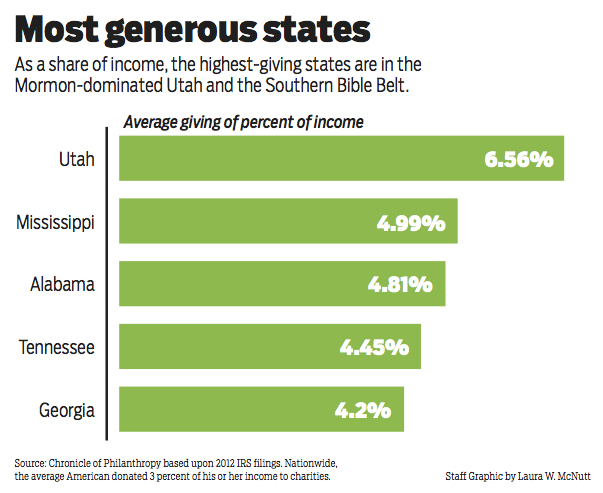CHATTANOOGA GIVING BY THE NUMBERS• 4.68: Percent of income donated by the typical Chattanoogan, or more than 50 percent above U.S. average of 3 percent• $4,797: Median contribution by typical Chattanoogan in 2012• $360 million: Total charitable contributions in six-county Chattanooga metro areaSource: Chronicle of Philanthropy study based upon 2012 IRS data
The average Chattanoogan gives away at least 50 percent more of his or her disposable income to charities and religious groups than does the typical American.
A new study of tax filings released Monday showed that Chattanoogans, on average, donated $4,797 to churches or charities in 2012, swelling total giving in metro Chattanooga that year to a record high of nearly $360 million.
"Chattanooga is a generous town and continues with a culture of giving from people of all income levels," said Pete Cooper, president of the
Community Foundation of Greater Chattanooga, one of a half-dozen major multimillion-dollar foundations in Chattanooga. "Among the wealthy, there has long been a philosophy of charitable giving which helped establish some of the state's biggest foundations here decades ago. But among low- and middle-income families there is also a commitment to giving because I think our citizens recognize the needs around them and they understand where their gifts go and help out."
The United Way of Greater Chattanooga, which raises money to support more than 60 area programs, raised a record $12.59 million last year and campaign organizers hope to do even better with their current fundraising appeal.
"Obviously, during the recession, we had some struggles but Chattanooga has always been known for its philanthropy," said Eva Dillard, president of the Chattanooga United Way."Even people that don't have a lot of money here are willing to give what they can to help others who have less or are in some need. We've found as we grow the engagement of people with our work, our giving goes up."
The Chronicle of Philanthropy analyzed IRS tax data available by ZIP codes from 2012 and found, as it has in previous such studies, the highest share of income is donated in Utah and the South, even above wealthier states.
Charitable giving in Utah is influenced by the heavy concentration there of the Mormon Church, which calls upon its members to give at least 10 percent of their income to charity as part of the Biblical tithe.
In the Bible Belt of the South, individual giving is also higher, especially to churches and other religious groups which attract more attendance and support than in other parts of the country.
With lower tax rates in the South, individuals also have a bigger amount of their own income to keep and government tends to provide fewer social services often provided by religious and other nonprofit charities.
The Chronicle study found in the Southern Bible Belt, Alabama, Tennessee and Georgia, respectively, ranked beyond only Utah and Mississippi in the share of personal income given away.
The least charitable states, measured by the share of income given away, were New Hampshire, Maine and Vermont. Stacy Palmer, editor of the Chronicle of Philanthropy, said the lower giving levels in northern New England reflect the lower rates of church attendance and the region's "independent streak" and tradition of self reliance.
The higher giving levels in the lower-income South also reflects the nationwide trend in giving during and after the Great Recession.
According to the Chronicle report, Americans who earned $200,000 or more reduced the share of their income they gave to charity by 4.6 percent from 2006 to 2012. But those earnings less than $100,000 increased their charitable giving by 4.5 percent in the same period.
A faith-based group headquartered in Chattanooga known as Generous Giving is trying to reverse that trend. Todd Harper, president of the 14-year-old group formed to encourage wealthy Christians to increase their charity, said his group highlights the joy of giving, even in tougher times.
"In the audience we have been engaging across the country, many people in the financial crisis actually began giving more as a share of their income," Harper said. "There was an incredible desire to see the causes they cared about still funded during these harder times and people recognize through a downturn like this that there are no investments that are truly secure in a temporal sense. Many of our people found that giving really is the most secure investment in an eternal sense."
Harper and others in the Maclellan Foundation-backed Generous Giving program conduct workshops and experiences across the country to showcase the power of giving.
"The question is not how much to give," Harper said. "The real question is how much you should keep -- and then give the rest away. We live in a materialistic, consumeristic economy, but many of the people we talk with have found the greatest joy they have found is not in spending their money, but in giving it away."
The Associated Press contributed to this report.
Contact Dave Flessner at dflessner@timesfreepress.com or at 757-6340.

